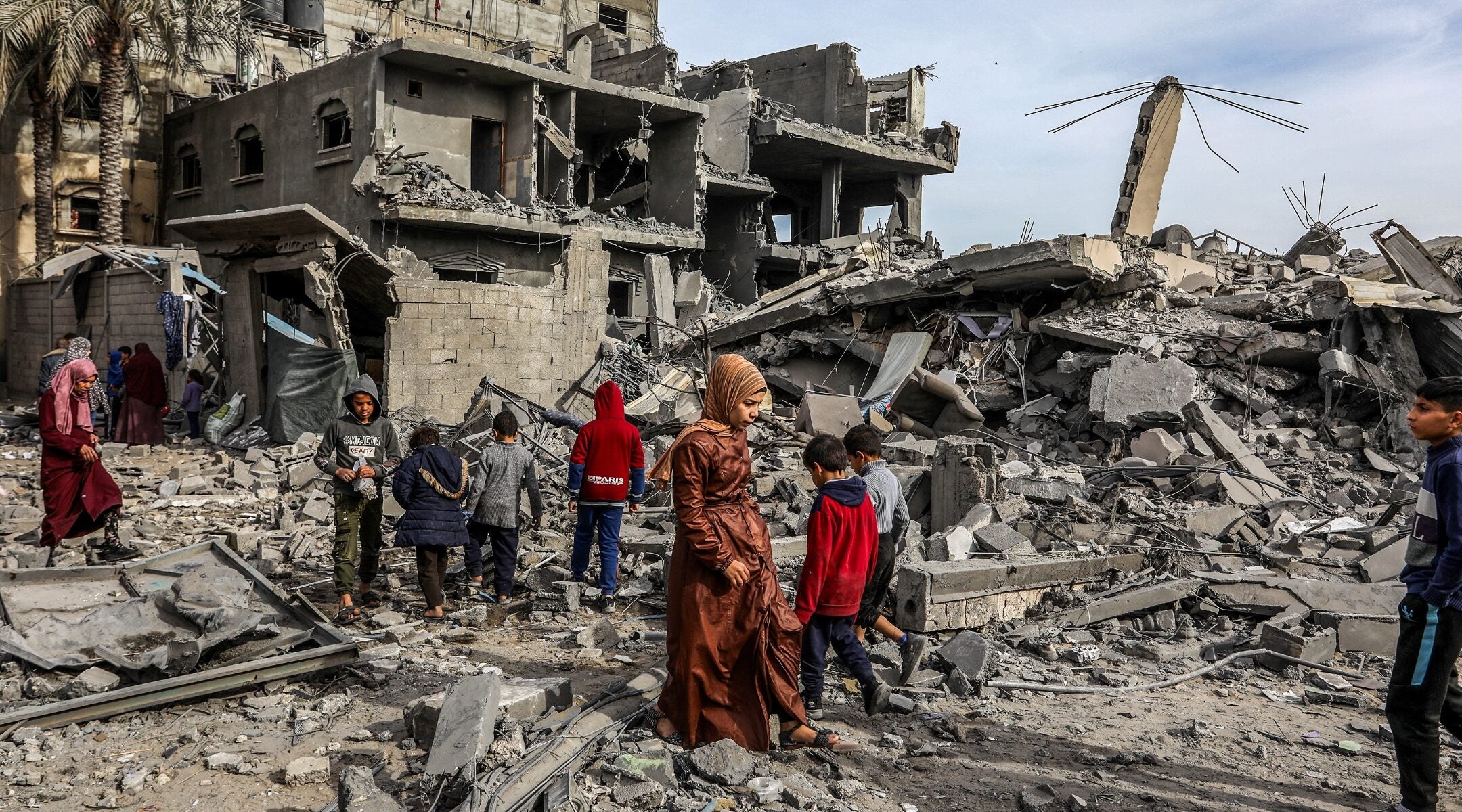WASHINGTON (JTA) — Egypt’s foreign minister dampened speculation that the country’s peace treaty with Israel would be at risk if Israel invaded Rafah, a city on Gaza’s border with Egypt.
In recent days, Israeli officials have said they plan to send ground troops into Rafah as the next stage in their war against Hamas. More than a million Palestinians, the majority of Gaza’s population, have been sheltering in the city.
Over the weekend, the Associated Press quoted two Egyptian officials and a Western diplomat saying that a mass influx of Palestinians into Egypt could endanger the treaty. And on Saturday, Josep Borrell, the European Union foreign policy chief, said an Israeli invasion of Rafah would “lead to an unspeakable humanitarian catastrophe and grave tensions with Egypt.”
But on Monday, Egyptian Foreign Minister Sameh Shoukry denied the A.P. report and said that Egypt would uphold the its accord with Israel, which the countries signed in 1979.
“A peace agreement between Egypt and Israel already exists, which has been in effect for the past forty years, and we will continue it,” Shoukry said at a press conference in Slovenia, where he is on an official visit.
Israel’s impending invasion of Rafah comes after its military battled Hamas in the population centers of Gaza and Khan Younis. But the city’s high concentration of civilians, most of whom fled there from other parts of the territory, has raised alarms internationally.
“I think you all know more than a million Palestinians are sheltering in and around Rafah,” John Kirby, the National Security Council spokesman, told reporters on Thursday. “I could tell you that — absent any full consideration of protecting civilians at that scale in Gaza — military operations right now would be a disaster for those people, and it’s not something that we would support.”
The following day, Israeli Prime Minister Benjamin Netanyahu said that he was planning a Rafah incursion, but said that he ordered the military to draw up “a combined plan for evacuating the population and destroying the battalions” to submit to the government.
“It is impossible to achieve the goal of the war of eliminating Hamas by leaving four Hamas battalions in Rafah,” his office said in a statement. “On the contrary, it is clear that intense activity in Rafah requires that civilians evacuate the areas of combat.”
On Monday morning, Israel conducted a military operation in Rafah to rescue two Israeli hostages. Israel’s Army Radio reported over the weekend that Egypt has told Israel it would not stand in the way of an Israeli invasion of Rafah if there were no civilian casualties, an unlikely scenario.
Hamas launched the war with an invasion of Israel on Oct. 7 that killed some 1,200 people, mostly civilians, and took some 250 hostage. More than 27,000 Palestinians have been killed in the ensuing war, including thousands of children. Israel says approximately a third of the dead are combatants. International health officials have said the territory is on the verge of famine.
Early in the war, there were proposals to evacuate Palestinians from Gaza to Egypt that did not come to fruition. On Sunday, Netanyahu told ABC that he did not intend to evacuate Rafah residents to Egypt, but rather to “the areas that we’ve cleared north of Rafah — plenty of areas there.”
Since the war began — as in previous Israel-Hamas conflicts — Egypt has acted as a broker between the two sides as they negotiate over a ceasefire and the release of hostages. The Egyptian and Israeli militaries also share intelligence to thwart terrorism attacks originating in the Sinai.
Prior to their treaty, which is known as the Camp David Accords, Egypt was Israel’s most formidable enemy, fighting four wars against it. As part of the peace deal, which was brokered by President Jimmy Carter, Israel returned the Sinai Peninsula, which it conquered from Egypt in the 1967 Six Day War.
The accords were the first any Arab country signed with Israel, and have proven enduring, surviving the 1981 assassination of President Anwar Sadat, who signed the deal alongside Israeli Prime Minister Menachem Begin, as well as a decade or so of unrest caused by Islamist groups in the Sinai. The accords also lasted through a brief period following the Arab Spring when Egypt’s government was led by the Islamist Muslim Brotherhood, of which Hamas is an offshoot.
The last time the accord appeared under threat was during negotiations in the late 1980s, when Israel resisted relinquishing a tiny slice of the northeastern Sinai as long as Egypt had not paid compensation to families of six Israeli tourists murdered by an Egyptian policeman in 1985.
JTA has documented Jewish history in real-time for over a century. Keep our journalism strong by joining us in supporting independent, award-winning reporting.






